6.形容词
- 格式:doc
- 大小:78.50 KB
- 文档页数:4
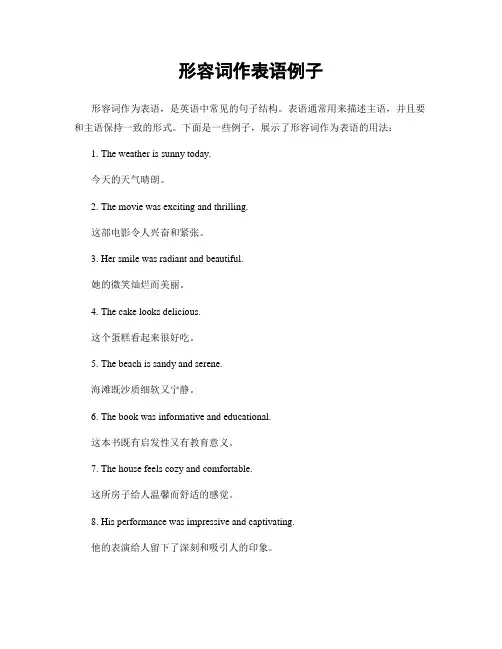
形容词作表语例子
形容词作为表语,是英语中常见的句子结构。
表语通常用来描述主语,并且要和主语保持一致的形式。
下面是一些例子,展示了形容词作为表语的用法:
1. The weather is sunny today.
今天的天气晴朗。
2. The movie was exciting and thrilling.
这部电影令人兴奋和紧张。
3. Her smile was radiant and beautiful.
她的微笑灿烂而美丽。
4. The cake looks delicious.
这个蛋糕看起来很好吃。
5. The beach is sandy and serene.
海滩既沙质细软又宁静。
6. The book was informative and educational.
这本书既有启发性又有教育意义。
7. The house feels cozy and comfortable.
这所房子给人温馨而舒适的感觉。
8. His performance was impressive and captivating.
他的表演给人留下了深刻和吸引人的印象。
以上是几个形容词作为表语的例子,它们用来描述主语的状态、特性或品质。
形容词作为表语常常使得句子更加生动有趣,帮助读者更好地理解和感受描述的内容。
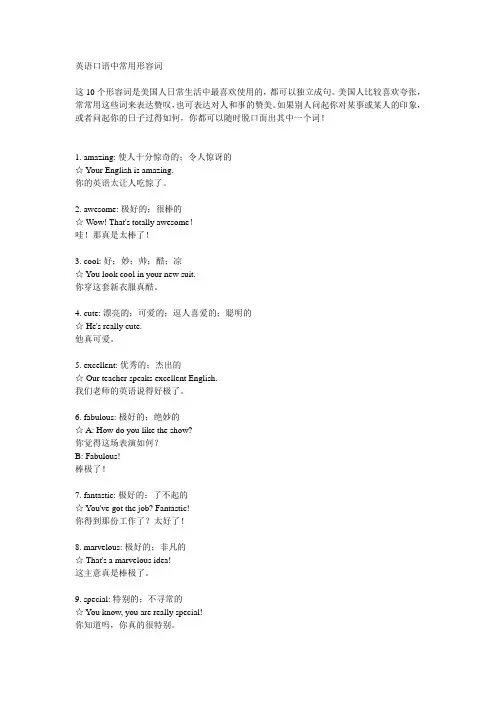
英语口语中常用形容词这10个形容词是美国人日常生活中最喜欢使用的,都可以独立成句。
美国人比较喜欢夸张,常常用这些词来表达赞叹,也可表达对人和事的赞美。
如果别人问起你对某事或某人的印象,或者问起你的日子过得如何,你都可以随时脱口而出其中一个词!1. amazing: 使人十分惊奇的;令人惊讶的☆ Y our English is amazing.你的英语太让人吃惊了。
2. awesome: 极好的;很棒的☆ Wow! That's totally awesome!哇!那真是太棒了!3. cool: 好;妙;帅;酷;凉☆ Y ou look cool in your new suit.你穿这套新衣服真酷。
4. cute: 漂亮的;可爱的;逗人喜爱的;聪明的☆ He's really cute.他真可爱。
5. excellent: 优秀的;杰出的☆ Our teacher speaks excellent English.我们老师的英语说得好极了。
6. fabulous: 极好的;绝妙的☆ A: How do you like the show?你觉得这场表演如何?B: Fabulous!棒极了!7. fantastic: 极好的;了不起的☆ Y ou've got the job? Fantastic!你得到那份工作了?太好了!8. marvelous: 极好的;非凡的☆ That's a marvelous idea!这主意真是棒极了。
9. special: 特别的;不寻常的☆ Y ou know, you are really special!你知道吗,你真的很特别。
10. wonderful: 精彩的;绝妙的;令人惊奇的☆ She has a wonderful memory.她的记忆力惊人。
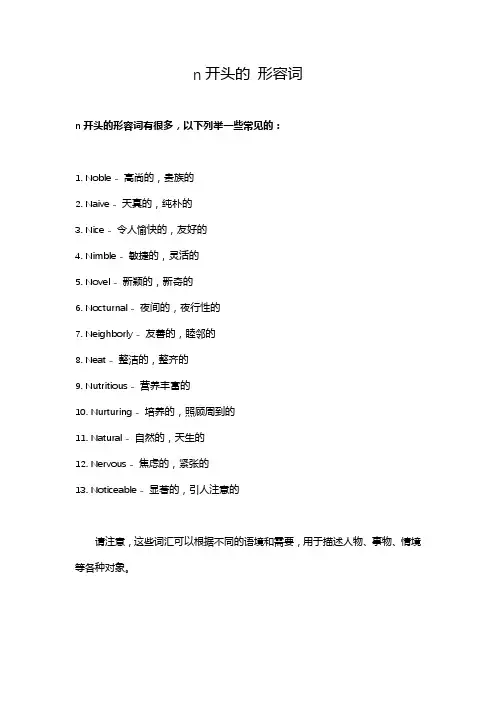
n开头的 形容词
n开头的形容词有很多,以下列举一些常见的:
1. Noble - 高尚的,贵族的
2. Naive - 天真的,纯朴的
3. Nice - 令人愉快的,友好的
4. Nimble - 敏捷的,灵活的
5. Novel - 新颖的,新奇的
6. Nocturnal - 夜间的,夜行性的
7. Neighborly - 友善的,睦邻的
8. Neat - 整洁的,整齐的
9. Nutritious - 营养丰富的
10. Nurturing - 培养的,照顾周到的
11. Natural - 自然的,天生的
12. Nervous - 焦虑的,紧张的
13. Noticeable - 显著的,引人注意的
请注意,这些词汇可以根据不同的语境和需要,用于描述人物、事物、情境
等各种对象。
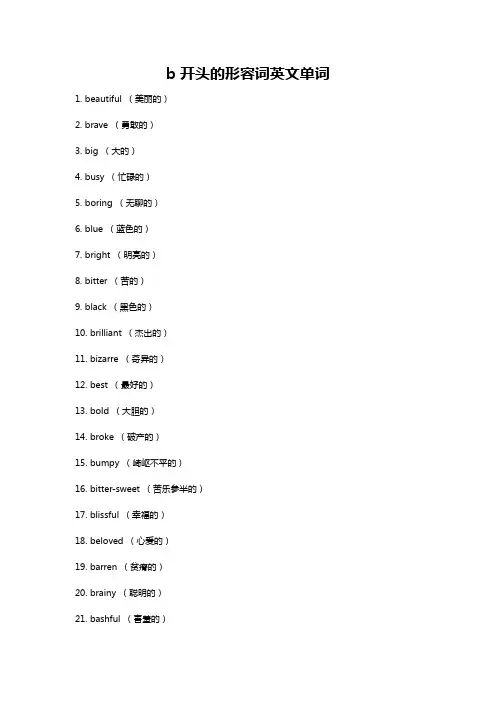
b开头的形容词英文单词1. beautiful (美丽的)2. brave (勇敢的)3. big (大的)4. busy (忙碌的)5. boring (无聊的)6. blue (蓝色的)7. bright (明亮的)8. bitter (苦的)9. black (黑色的)10. brilliant (杰出的)11. bizarre (奇异的)12. best (最好的)13. bold (大胆的)14. broke (破产的)15. bumpy (崎岖不平的)16. bitter-sweet (苦乐参半的)17. blissful (幸福的)18. beloved (心爱的)19. barren (贫瘠的)20. brainy (聪明的)21. bashful (害羞的)22. bizarre (离奇怪异的)23. breezy (有微风的)24. busty (丰满的,具有曲线的)25. brutal (残忍的)26. ballistic (暴躁的)27. burdensome (繁重的)28. bountiful (丰富的)29. brilliant (光辉的)30. breathtaking (惊险的)31. blissful (无忧无虑的)32. bizarre (离奇古怪的)33. balanced (平衡的)34. broken (破碎的)35. bubbly (活泼的)36. barren (荒凉的)37. brave (勇敢的)38. loyal (忠诚的)39. bad (坏的)40. busy (繁忙的)41. blessed (神圣的)42. basic (基础的)43. bright (明亮的)44. beautiful (美丽的)45. brave (英勇的)46. brilliant (才华横溢的)47. bubbly (充满活力的)48. bulky (臃肿的)49. bashful (害羞的)50. brilliant (耀眼的)。
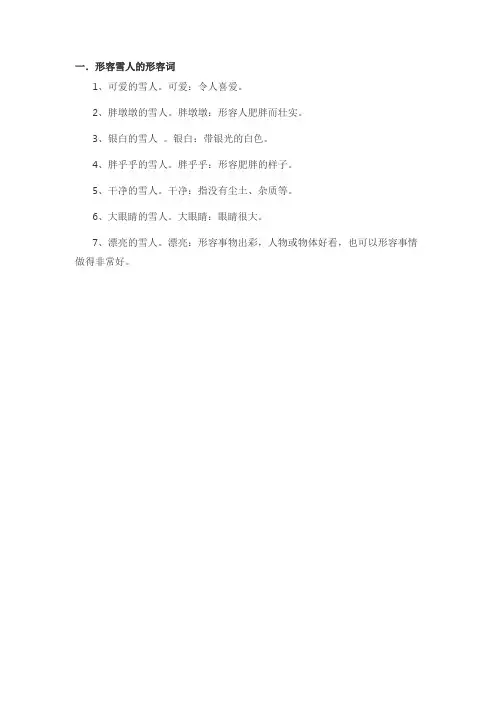
一.形容雪人的形容词
1、可爱的雪人。可爱:令人喜爱。
2、胖墩墩的雪人。胖墩墩:形容人肥胖而壮实。
3、银白的雪人 。银白:带银光的白色。
4、胖乎乎的雪人。胖乎乎:形容肥胖的样子。
5、干净的雪人。干净:指没有尘土、杂质等。
6、大眼睛的雪人。大眼睛:眼睛很大。
7、漂亮的雪人。漂亮:形容事物出彩,人物或物体好看,也可以形容事情
做得非常好。
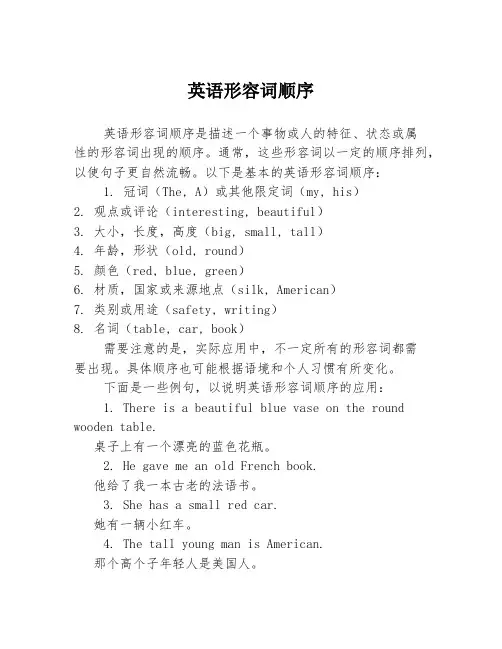
英语形容词顺序英语形容词顺序是描述一个事物或人的特征、状态或属性的形容词出现的顺序。
通常,这些形容词以一定的顺序排列,以使句子更自然流畅。
以下是基本的英语形容词顺序:1. 冠词(The, A)或其他限定词(my, his)2. 观点或评论(interesting, beautiful)3. 大小,长度,高度(big, small, tall)4. 年龄,形状(old, round)5. 颜色(red, blue, green)6. 材质,国家或来源地点(silk, American)7. 类别或用途(safety, writing)8. 名词(table, car, book)需要注意的是,实际应用中,不一定所有的形容词都需要出现。
具体顺序也可能根据语境和个人习惯有所变化。
下面是一些例句,以说明英语形容词顺序的应用:1. There is a beautiful blue vase on the round wooden table.桌子上有一个漂亮的蓝色花瓶。
2. He gave me an old French book.他给了我一本古老的法语书。
3. She has a small red car.她有一辆小红车。
4. The tall young man is American.那个高个子年轻人是美国人。
5. I bought a lovely little white puppy from the local pet store.我在当地宠物店买了一只可爱的小白狗。
6. I need a large square wooden table for my dining room.我需要一张大的方形木质餐桌放在我的餐厅。
7. It's a dangerous electric device.这是一个危险的电子设备。
以上只是一些例子,英语形容词顺序并非都要严格遵守,而是更多地遵循语言的习惯和流畅度。
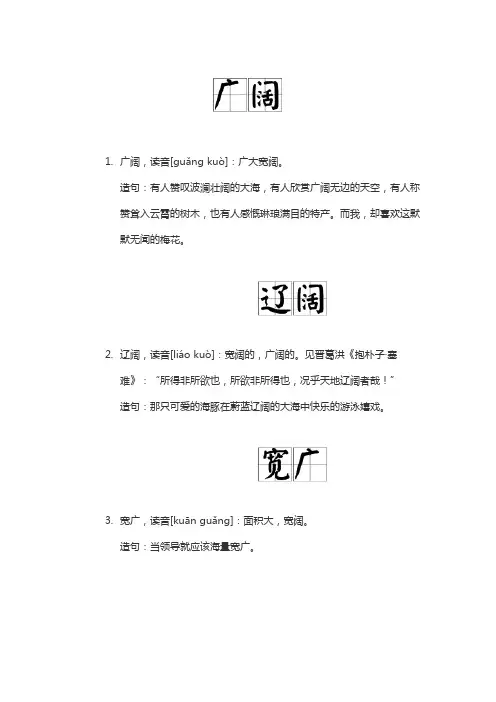
1.广阔,读音[guǎng kuò]:广大宽阔。
造句:有人赞叹波澜壮阔的大海,有人欣赏广阔无边的天空,有人称赞耸入云霄的树木,也有人感慨琳琅满目的特产。
而我,却喜欢这默默无闻的梅花。
2.辽阔,读音[liáo kuò]:宽阔的,广阔的。
见晋葛洪《抱朴子·塞难》:“所得非所欲也,所欲非所得也,况乎天地辽阔者哉!”造句:那只可爱的海豚在蔚蓝辽阔的大海中快乐的游泳嬉戏。
3.宽广,读音[kuān guǎng]:面积大,宽阔。
造句:当领导就应该海量宽广。
4.碧蓝,读音[bìlán]:中国传统色彩名词,深而澄的蓝色,青蓝色。
造句:幻想在超大泳池旁享受日光浴,鸟瞰碧蓝大海。
5.汹涌,读音[xiōng yǒng]:水势翻腾上涌。
造句:轮船在汹涌的海上缓缓前进。
6.澎湃,读音[péng pài] 1.形容波浪猛烈的发出巨大声响的撞击2.指声势、气势等浩大雄伟。
造句:惊涛拍岸,令人心潮澎湃。
7.磅礴,读音[páng bó]:形容词,形容气势盛大,广大无边。
一般形容名山大川气势浩大,或是形容河流奔腾时气势磅礴。
造句:中国的振兴和发展,正以排山倒海之势,雷霆万钧之力,磅礴于全世界。
8.浩瀚,读音[hào hàn]:1.水势广大的样子2.广阔的3.;大量的。
造句:南海浩瀚无边,守护着我国疆土。
9.无垠,读音[wúyín]:无边。
造句:在一望无垠的大海上,海鸥们在欢叫着。
10.深沉,读音[ shēn chén ]:1.指声音低沉2.形容程度深3.沉稳;不外露。
造句:父亲是大海,深沉而又宽广。
描写大海的四字成语:波澜壮阔、波涛汹涌、海阔天空、风平浪静、无边无际、百川归海、水天一色、惊涛骇浪、一望无际、汹涌澎湃、波光粼粼、堆山积海、海水群飞、海不扬波。
6.形容词 一、形容词的含义及位置 1、形容词的含义:表示人或事物的属性和特征,起到修饰和描绘名词的作用。 2、形容词的位置:A、放在be后面,修饰主语 。 Eg:she is beautiful。 B、放在名词前,修饰名词。 Eg:she is a beautiful girl。 C、修饰不定代词是要放在不定代词的后面。Eg:I have something important to tell you.
比较级形式 例词
单音节形容词
大多数单音节形容词 +-er high → higher small → smaller
以-e结尾 +-r large → larger wide → wider
一个元音 + 一个辅音 双写辅音字母,再加-er big → bigger hot → hotter
双音节形容词
以-y或-ly结尾 去掉y,再加-ier happy → happier silly → sillier
以非重读元音、/l/或/R(r)/结尾 +-er(-r) clever → cleverer simple → simpler
以-ful,-less,-ed,-ing结尾 more+形容词原级 careful → more careful
boring → more boring
多音节形容词 含三个或三个以上音节 more+形容词原级 difficult → more difficult
popular → more popular
最高级形式 例词
单音节形容词
大多数单音节形容词 + -est high →highest small →smallest
以-e结尾 + -st large →largest wide →widest 一个元音 + 一个辅音 双写辅音字母,再加-est big →biggest hot → hottest
双音节形容词
以-y或-ly结尾 去掉y,再加-iest happy → happiest silly → silliest 以非重读元音、/l/或/R(r)/结尾 + -est(-st) clever → cleverest simple → simplest
以-ful,-less,-ed,-ing结尾 most +形容词原级 careful → most careful boring → most boring 多音节形容词 含三个或三个以上音节 most +形容词原级 difficult → most difficult popular → most popular 二、形容词原级的用法 1.说明人或事物自身的特征、性质或状态时用形容词原级。如: 2.有表示绝对概念的副词very , so , too, enough, quite等修饰时用形容词原级。 3.表示A与B在某方面程度相同或不同时用形容词原级。 (1)肯定句中的结构:" A...+as+形容词原级+as + B"。 (2)否定句中的结构:"A...+as/so+形容词原级+as + B"。 否定句的结构中部分双音节和多音节形容词除使用“not...as/so+形容词原级+as”结构外,还可使用“less+形容词原级十than',结构。如: He thinks Chinese is less interesting than English.他认为汉语没有英语有趣。 (3)表示“A是B的……倍”时,用“A...+倍数+as+形容词原级+as +B”结构(一倍:once,两倍:twice, 三倍及以上:基数词+ times)。如:Our school is three times as big as theirs.我们学校是他们学校的三倍大。 (4) half as+形容词原级+as表示“……是……的一半”。如: Her room is half as big as yours.她的房间是你的一半大。 三、形容词比较级的用法 1.表示两者进行比较时用形容词比较级,其结构为“A...+比较级+than + B"。如: 注意:为了避免重复,在从句中常用the one, that, those等词来代替前面出现过的名词。其中the one代替可数名词单数形式,the ones或those代替可数名词复数形式,that代替不可数名词。如: The weather of Tianjin is colder than that of Guangzhou in winter. 冬天,天津的天气比广州的冷。 2.有表示程度的副词a little, a bit, a great deal, a lot, much, even, still, far, rather, any等修饰形容词时,该形容词可以用比较级。如:It is much colder today than yesterday-今天比昨天冷得多。 3.表示两者之间进行选择“哪一个更…”时,用句型" Which/Who is+形容词比较级,A or B? 表示。 4.表示“几倍于……”时,用“倍数+比较级+than”表示。如: Your room is three times bigger than mine.你的房间比我的大三倍。 5.表示“两者之间比较……的一个(of the two)”时,常用“ the+比较级 ” 结构。如: Mary is the taller of the twins. 玛丽是双胞胎中比较高的那个。 6.表示“越来越……”,用 “比较级+and+比较级”(前后为同一词),如:taller and taller 越来越高 当形容词为多音节词或部分双音节词时,用"more and more+形容词原级” more and more beautiful 越来越漂亮。 7.表示“越……越……”时,用“the+比较级,the+比较级”(前后为不同的词),如:the more ,the better越多越好。 四、形容词最高级的用法 1.表示三者或三者以上的人或物进行比较时,用最高级形式。形容词最高级前必须加定冠词the,句末常跟一个in/of短语来表示范围。 2.表示在三者或三者以上的人或物中进行选择时,用" Which/Who is十the十最高级,A,B or C?”结构。 3.表示“最……的……之一”时,用“one of the+形容词最高级”结构,该形容词后面的名词要用复数形式。 4.形容词最高级前面可以加序数词,表示“第几最……”。如: 5.形容词最高级前面可以有物主代词、指示代词、名词所有格等修饰,此时不能再用定冠词。 6.形容词比较级结构可以表示最高级含义。 如: Li Lei is the tallest student in his class. 李雷是他班上最高的学生。 =Li Lei is taller than any other student in his class. 李雷比班上其他任何一个学生都高。 =Li Lei is taller than the other students in his class. 李雷比班上其他所有的学生都高。 =Li Lei is taller than anyone else in his class. 李雷比班上其他任何人都高。 =No one is as tall as Li Lei in his class. 在班里没有人和李雷一样高。 =No one is taller than Li Lei in his class. 在班里没有人比李雷高。 =Li Lei is taller than any of the other students in his class.李雷比班里其他任何学生都高。 =Li Lei is taller than the rest of students in his class.李雷比他班里其余的学生都高。 易混点清单:
一、-ing形容词和-ed形容词: -ing形容词:表示主动意义,多指事物对人的影响,一般修饰事物。 -ed形容词:表示被动意义,多指人对事物的感受,主语一般是人,常用于“sb.+be+ -ed形容词+介词”结构。 二、形容词最高级前不加the的情况 当形容词最高级前有物主代词、指示代词、名词所有格时不必加the。
三、farther和further far的比较级是farther和further。其用法区别是:在谈论地点、方向或距离时,farther和further可以互换。但further还有“更多,进一步,稍后,额外”等含义,这时不能与farther互换使用。
四、older和elder 1. old的比较级是older和elder older常用于比较的句型中,表示“较老的,较旧的,年纪较大的”。 elder一般用于比较一家人的年龄长幼,意为“年长的”。 2. elder除指家庭成员外,也可以指其他人,意思是“资格老的”。
五、good, well ,fine和nice 1. good是形容词,用作表语和定语.它表示电影、书箱等某种东西的内容好,表示人品好,善良等。 2. well兼作形容词和副词,作形容词时,只作表语,指身体健康。 3. fine通常指天气好,气质好,发育好等。 4. nice往往指“令人容悦的。讨人喜爱的”人、味道、言语、天气等。
六、ill和sick 两个词都是“病的,生病的”之意,都可以作表语,但作定语时只能用sick,而不能用ill (ill作定语时表示“坏的”)。如:The sick man is his uncle.那位病人是他叔叔。 He has been ill for two days.他已经病了两天了。
七、在同一范围内比较时,必须把主体排除在被比较的范围之外。如: China is larger than any other country in Asia. 中国比亚洲其他任何一个国家都大。(在同一范围内,只能和其他对象进行比较) China is larger than any country in Africa. 中国比非洲的任何一个国家都大。(在不同范围内,可以和其中任意一个对象进行比较)
八、以一ly 结尾的形容词 许多形容词加-ly可以构成副词,但有些以-ly结尾的词不是副词,而是形容词。如: friendly友好的 lonely孤独的 lovely可爱的 likely 有希望的 daily日常的 lively有生气的
九、black和dark 都可作形容词,也可作名词,区别为:black的意思是“黑色(的)”,指颜色,其反义词是white; dark的意思“暗、天黑、黑暗”,指无光。